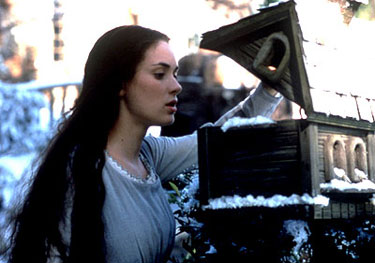Lucidno  Classical music in film
Classical music in film
| In Belle Toujours, Manoel de Oliveira's exquisite and ingeniously titled quasi-sequel to Belle du Jour, there is a long-ish sequence (relative to the film's 68 minutes) of a performance of the third and fourth movements of Dvorak's Symphony No 8 by L'Orchestre de la Fondation Calouste Gulbenkian, conducted by Lawrence Foster. I detail this because it is one of the rare extended sequences of classical music in a film, to which the characters listen intently, without talking.
Another contemplative drama released at the same time, Jean Becker's Conversations with My Gardener, also uses music diegetically, in this case the second movement of Mozart's Clarinet Concerto in A major, to make a poignant cultural point. Why is it so uncommon for characters in films to listen to classical music? Unfortunately, this is a reflection of the pervasiveness of pop music. In films, the music regurgitating from radios and CD is, more likely than not, pop. One day, a radical film-maker will show a non-wimpish teenager listening to Schoenberg while reading Kierkegaard. Leaving aside the many meretricious or fanciful biopics of composers (I exempt Straub-Huillet's The Chronicle of Anna Magdalena Bach, 1968) or films about musicians, there have been few instances of celluloid characters actually listening to classical music. Unfortunately, most of these efforts have been less than successful. Ingmar Bergman presented the overture to The Magic Flute (1975) as if it was a Coca-Cola commercial, cutting rapidly between faces in an audience of all ages and races. Then, from time to time, during the performance, he would cut to a young girl's enraptured face when, in reality, she probably would have been bored stiff.
But for unintentional risibility, nothing beats the scene from The Shawshank Redemption (1994) when hardened cons stand in emotional silence as they listen to the Sull'Aria duet from The Marriage of Figaro over the prison loudspeakers. Red, played by Morgan Freeman, says: "I have no idea to this day what those two Italian ladies were singing about. Truth is, I don't want to know. Some things are better left unsaid." You bet! (Just to be pedantic, these two "Italian ladies" are Spanish, and they were sung by the Swiss soprano Edith Mathis and her Austrian counterpart Gundula Janowitz.) |
In the same year, in Gillian Armstrong's Little Women, when Jo (Winona Ryder) is taken to see the opera The Pearl Fishers by Professor Bhaer (Gabriel Byrne), they talk (albeit in a whisper) during the celebrated duet for tenor and baritone. Just as irritating is the scene in Woody Allen's Hannah and Her Sisters (1986) when Dianne Wiest and Sam Waterston make comments during an aria (sung by Maria Chiara) from Manon Lescaut, which they are supposed to be enjoying. One also sympathises with Kirk Douglas, whose attempt to listen to a record of Brahms' Piano Concerto No 2 in Joseph Mankiewicz's A Letter to Three Wives(1949) is frustrated by a philistine radio producer (Florence Bates), who scratches the disc while trying to find her dreadful programme.
Classical music in the movies, instead of elevating those who listen to it, often seems to have a detrimental effect. In Stanley Kubrick's A Clockwork Orange (1971), teenage thug Alex (Malcolm McDowell) overdoses on his favourite piece of music, the putatively uplifting Beethoven's Ninth Symphony, which only amplifies his violent nature. Coincidentally, one of the adolescent killers in Gus Van Sant's Elephant (2003) is also called Alex; he plays Beethoven's Für Elise on the piano before slaughtering his classmates. In Funny Games (1997), Michael Haneke makes sure that the bourgeois family who have the effrontery to like opera get their brutal comeuppance. As they set out for their holiday and play an opera guessing game in the car, the soundtrack gives way approvingly to heavy metal. Haneke's The Piano Teacher (2001) continues to expound the bogus notion that the study of classical music sublimates passion, and has the perverted titular heroine (Isabelle Huppert) quote Adorno's theoretical link between madness and music. More lighthearted, though no less murderous, is the gang of five headed by Alec Guinness in Alexander Mackendrick's The Ladykillers (1955), who disguise their nefarious plans by pretending to rehearse the Menuetto from Luigi Boccherini's String Quintet in E major. In the Coen brothers' dispensable 2004 remake, the plotters feign to be rehearsing the same piece though, for the sake of a poor joke, they only have wind instruments. One of the few directors who understands classical music more than superficially, making listening to it an integral part of the text, is Jean-Luc Godard (Pier Pasolini has seldom been bettered for the use of non-diegetic classical music, but that's another blog). In Breathless (1959), Michel Poiccard (Jean-Paul Belmondo), a small time thief who has casually killed a policeman, listens to Mozart's Clarinet Concerto, K622, as his girlfriend (Jean Seberg) plans to betray him. Their interplay and the circular camera shot is reflected in the interplay between the solo instrument and the orchestra, and in the rondo-like theme. In Weekend (1967), Godard makes three 360-degree tracking shots around a farmyard as Mozart's Piano Sonata No 18, K576, plays. For Ever Mozart (1996) is constructed around a classical sonata form, ending with a partial performance. Directors like Godard and Oliveira teach us that films can be as much about listening as seeing.
|


